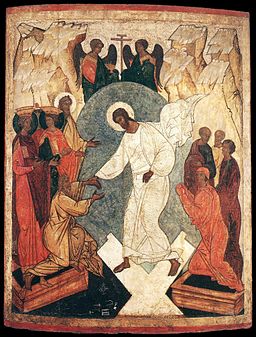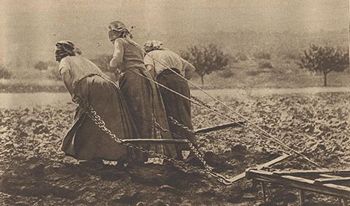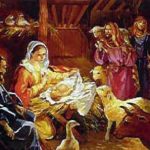The Plowing Of Hades
 The resurrection of Christ, which we will celebrate this coming Sunday, is the core teaching of the Christian faith. Upon this reality hangs every doctrine, belief, and truth of Christianity. As the Apostle Paul said:
The resurrection of Christ, which we will celebrate this coming Sunday, is the core teaching of the Christian faith. Upon this reality hangs every doctrine, belief, and truth of Christianity. As the Apostle Paul said:
If Christ hath not been raised, your faith is vain; ye are yet in your sins. Then they also that are fallen asleep in Christ have perished. If we have only hoped in Christ in this life, we are of all men most pitiable.
(1Co 15:17-19 ASV)
Note the link Paul gives between Christ being raised from the dead and our own hope of resurrection. Without Christ’s resurrection, we have no hope of leaving Hades and avoiding the fires of Hell into which Hades, and all within it, will be thrown into on the day of judgment. (Rev. 20:13-15)
The defeat of death, Hades, and the grave is what the resurrection of Christ accomplished. Likewise, the celebration is also known as The Harrowing of Hades.
For those not familiar, a harrow is a multipronged instrument used to plow the ground. To harrow something literally means to plow it up, or analogically, to disturb it.
Hades is known as the place of the dead. Our term actually comes from Greek mythology, as the Greek god Hades ruled the realm of the dead. In the Old Testament, it was called Sheol. Within its boarders, all who died, both the righteous and the wicked, were held, awaiting the final judgment. Death reigned over Adam and all his descendents until Christ.
The best scripture about Christ going to Hades and harrowing it is the Apostle Peter’s sermon on the day of Pentecost. Quoting from King David in Psalm 16, he says:
Because thou wilt not leave my soul unto Hades, Neither wilt thou give thy Holy One to see corruption. Thou madest known unto me the ways of life; Thou shalt make me full of gladness with thy countenance.
Brethren, I may say unto you freely of the patriarch David, that he both died and was buried, and his tomb is with us unto this day. Being therefore a prophet, and knowing that God had sworn with an oath to him, that of the fruit of his loins he would set one upon his throne; he foreseeing this spake of the resurrection of the Christ, that neither was he left unto Hades, nor did his flesh see corruption.
This Jesus did God raise up, whereof we all are witnesses.
(Act 2:27-32 ASV)
One of my favorite liturgical text personifies Hades. Hades swallowed Christ, got a really bad case of indigestion from the Giver of Life, and ended up vomiting out all the righteous.
 Death was plowed with Life.
Death was plowed with Life.
Sounds fantastical? Far fetched? Like something out of a novel I or any number of people might make up? To our modern and skeptical world, yeah. But there is one big difference between when we create and when God creates.
When we speculate, it becomes a story. When God speculates, it becomes reality.
This is the hope we celebrate this week: Christ entered death and Hades, plowed life into it, flung open its gates through His resurrection so that we too might rise in newness of life.
As Jesus comforted John upon seeing Him in His glory:
Fear not; I am the first and the last, and the Living one; and I was dead, and behold, I am alive for evermore, and I have the keys of death and of Hades.
(Rev 1:17b-18 ASV)
So fear not! Rejoice! For Christ has become our Passover Lamb. If we smear His blood over the doorpost of our hearts and souls, death will pass over us as well.
He has the keys to Hades.









































Man, this is just an awkward metaphor all around. I speak a little Farmer, and I can tell you that harrowing is not deep-level stuff. Harrowing is plowing, but not all plowing is harrowing. It’s what you do after you plow to break up the clods for an even seedbed. It’s also what you do to work fertilizer into the ground. Though the idea of Jesus spreading tons of urea onto Hell is a little funny. I’m not even sure the harrow was invented yet in Roman times.
So I wouldn’t use this metaphor in depth because it just stops making sense. Besides, I think harvest is a better metaphor for freeing the souls in Hades than plowing. And Jesus already had harvest metaphors going on, so yay.
And what’s that photo from? Because that’s incongruously depressing that they’re hand-pulling a plow meant for horses.
Plowing is only one meaning, but related, to the general meaning to disrupt.
Here’s a further etymology of it:
Note: The above quote tends to use Hell and Hades interchangeably, but strictly speaking they are two different thing.
I’d take issue that it is an understanding which developed after the Apostles Creed. Be that as it may, it is obvious from Scripture that Christ rising again gave us the opportunity to join with Him and rise to new life ourselves.
I still like the imagery of Christ’s life plowing up Hades, disrupting it, because His life cannot be contained by Hades and death, nor can it hold the Giver of Life. Not a perfect analogy, but still cool.
Strictly strictly speaking, Hades is a Grecian concept that the NewT seems to have borrowed so that dem Gentiles could follow along.
But I think it’s still awkward, because I can’t associate plowing with destruction, probably because I grew up speaking a little Farmer.
This was a great and informative piece. Thank you.